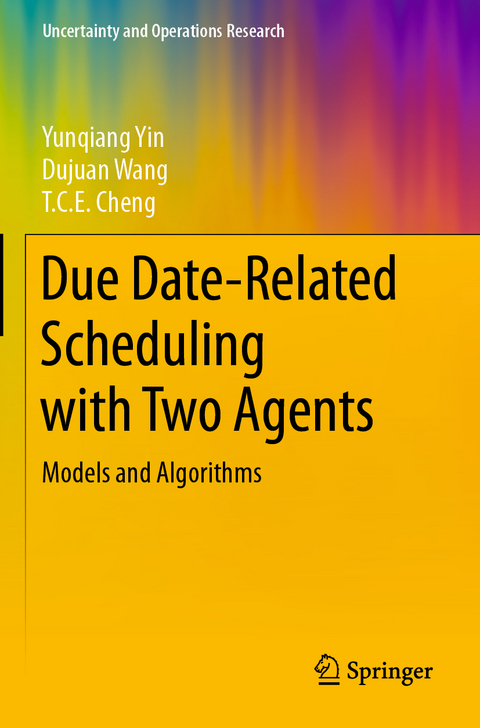
Due Date-Related Scheduling with Two Agents
Springer Verlag, Singapore
978-981-15-2107-2 (ISBN)
As for due dates, this book addresses the following three different scenarios: (i) The due dates of the jobs from either one or both of the two agents are decision variables, which are determined using some due date assignment models; (ii) The due dates of jobs in each job set are considered as given parameters, whereas which due date corresponds to a given job needs to determine; and (iii) The due date of each job is exogenously given. When the last case is involved, the objective function of each agent is related to the number of just-in-time jobs that are completed exactly on their due dates.
For each considered scenario, depending on the model settings, and on the objective function of each agent, this book addresses the complexity, and the design of efficient exact or approximated algorithms.
This book aims at introducing the author's research achievements in due date-related scheduling with two agents. It is written for researchers and Ph.D. students working in scheduling theory and other members of scientific community who are interested in recent scheduling models. Our goal is to enable the reader to know about some new achievements on this topic.
Yunqiang Yin received the Ph.D. degree in applied mathematics from Beijing Normal University, Beijing, China, in 2009. He is currently a Professor with the School of Management and Economics, University of Electronic Science and Technology of China, Chengdu, China. He has published over 80 papers in journals such as Naval Research Logistics, Omega, European Journal of Operational Research, IEEE Transactions on Systems, Man, and Cybernetics: Systems, International Journal of Production Research, Information Sciences, International Journal of Economics, Annals of Operations Research, Journal of Scheduling, and Computers & Operations Research. His current research interests include Operations Research and Optimization, and Logistics Management. He was named one of the “most cited scientists” in computer science by the Elsevier in 2014 to 2018, respectively. Dujuan Wang received the B.S. and M.S. degrees in computer science andtechnology, and the Ph.D. degree in management science and engineering from the Dalian University of Technology (DUT), Dalian, China. She is currently an associate professor with the Business School, Sichuan University, Chengdu, China. He has published over 40 papers in journals such as Naval Research Logistics, Omega, European Journal of Operational Research, IEEE Transactions on Systems, Man, and Cybernetics: Systems, International Journal of Production Research, Information Sciences, International Journal of Economics, Annals of Operations Research, Journal of Scheduling, and Computers & Operations Research. Her current research interestsinclude scheduling theory, production and operations management, intelligent optimization, and computer applications. Dr. Wang is an Organizer of the IEEE Symposium on Computational Intelligence in E-Government 2016, and has been a member of the Program Committee of the 2015 International Conference on Advanced Computational Intelligence2015 and the Sixth International Conference on Swarm Intelligence 2015. T.C.E Cheng received the B.Sc.Eng. (First Class Hons.) degree from the University of Hong Kong, Hong Kong, the M.Sc. degree from the University of Birmingham, Birmingham, U.K., and the Ph.D. and Sc.D. degrees in operation research from the University of Cambridge, Cambridge, U.K. He is currently the Dean of the Faculty of Business, a Fung Yiu King–Wing Hang Bank Professor of Business Administration, and the Chair Professor of Management with Hong Kong Polytechnic University, Hong Kong. He has previously taught in Canada, England, and Singapore. He has published over 600 papers in journals such as California Management Review, the Journal of Operations Management, Management Science, MIS Quarterly, Operations Research, Organization Science, and Production and Operations Management. He has coauthored 12 books published by Chapman and Hall, McGraw-Hill, and Springer. His currentresearch interests include operations management and operations research. Prof. Cheng was a recipient of the Outstanding Young Engineer of the Year Award from the Institute of Industrial Engineers, USA, in 1992, and the Croucher Award (the top research award in Hong Kong) in 2001. He was named one of the “most cited scientists” in all fields, in business and economics, in computer science, and in engineering from 2005 to 2015 by the ISI Web of Science in 2015. He is a Registered Professional Engineer and a seasoned Management Consultant. Over the years, he has secured over HK 50 million in research funding from both public and private sectors to support his diverse research programs.
Chapter1. Introduction to scheduling.- Chapter2. Computational complexity.- Chapter3. Scheduling problems with assignable due dates.- Chapter4. Scheduling problems with due date assignment.- Chapter5. Integrated production, inventory, and batch delivery scheduling with due date assignment.- Chapter6. Scheduling problems to maximize the weighted number of JIT jobs.
| Erscheinungsdatum | 09.03.2021 |
|---|---|
| Reihe/Serie | Uncertainty and Operations Research |
| Zusatzinfo | 12 Illustrations, black and white; XIII, 187 p. 12 illus. |
| Verlagsort | Singapore |
| Sprache | englisch |
| Maße | 155 x 235 mm |
| Themenwelt | Mathematik / Informatik ► Mathematik ► Angewandte Mathematik |
| Mathematik / Informatik ► Mathematik ► Finanz- / Wirtschaftsmathematik | |
| Mathematik / Informatik ► Mathematik ► Wahrscheinlichkeit / Kombinatorik | |
| Sozialwissenschaften ► Soziologie ► Empirische Sozialforschung | |
| Wirtschaft ► Allgemeines / Lexika | |
| Wirtschaft ► Volkswirtschaftslehre | |
| Schlagworte | Batch delivery • Due date assignment • Dynamic Programming • Flowshop • Fully polynomial-time approximation scheme • Just-in-time scheduling • parallel machines • Pareto-optimal schedule • Schedule • Two agents |
| ISBN-10 | 981-15-2107-7 / 9811521077 |
| ISBN-13 | 978-981-15-2107-2 / 9789811521072 |
| Zustand | Neuware |
| Informationen gemäß Produktsicherheitsverordnung (GPSR) | |
| Haben Sie eine Frage zum Produkt? |
aus dem Bereich


